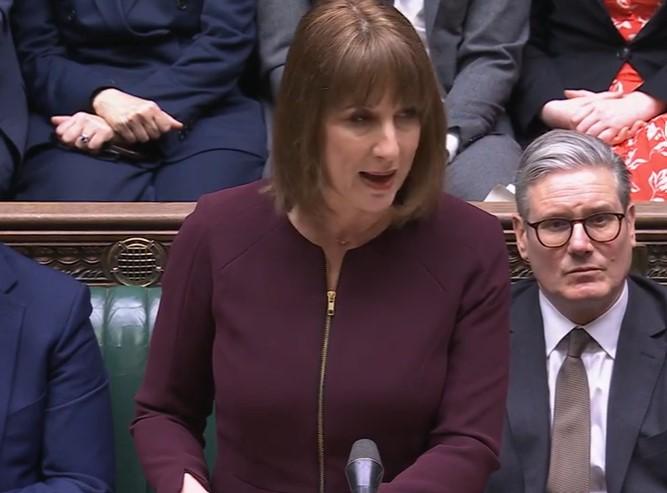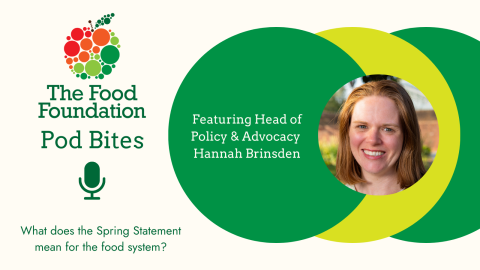27 March 2025
Our reaction to the Chancellor's Spring Statement

Following Chancellor Rachel Reeves' first Spring Statement, our Public Affairs Lead Joss MacDonald looks at the implications for the food system
When the Government announced £3 billion worth of cuts to the social security budget last week, few expected it would be swiftly followed by another half a billion’s worth of further cuts in Rachel Reeves' first Spring Statement.
There is a clear sense of anger from many quarters about these cuts. The unions, many in the charity sector, many Labour backbenchers have voiced public concern (and exasperation), and many more will have done so privately, including some who sit at the cabinet table.
The Government's own impact assessment predicts that these cuts will force 250,000 people into relative poverty, 50,000 of whom will be children. The Joseph Rowntree Foundation predicts the figure is closer to 400,000 people.
Even before these cuts, they govern a country where many are going hungry. The Food Foundation’s data from January 2025 shows that 18% of households with children are currently food insecure, meaning that at least one member of the household is cutting back on food, skipping meals entirely or going without food for an entire day.
It is safe to say then that the cuts today will lead to a rise in food insecurity and will lead to a rise in children going hungry in the UK.
It will also surely lead to a decline in the quality of children’s diets, and the manifold health issues that come with that.
They are health issues which, in many cases, will affect that child for the rest of their life. That is the choice that the Government has made.
The bond markets may be reacting positively to the Chancellor’s statement, but many households who are reliant on Personal Independence Payments or the higher rate of Universal Credit to put food on the table, will not be.
It is clear we are witnessing a new type of Labour Government – throughout the 20th and early 21st Centuries, the hallmark of all Labour Governments has been the strengthening of the welfare state.
Tackling child poverty is seen as a particular keystone of the Labour Party, not least after the undoubted achievements in this particular area by the last Labour government.
But as Save the Children said following the statement: "At the moment, this will be the first Labour Government likely to oversee a significant rise in the number of children in poverty”.
Labour’s manifesto contained a raft of strong and noble commitments which we, many others in the sector, and not least the public, will continue to hold them to. The Government was elected with promises to:
- Raise the healthiest generation of children ever
- Half the difference in healthy life expectancy between the richest and the poorest areas of the country
- End the ‘moral scar’ of mass dependency on emergency food parcels.
The Spring Statement pulls the country away from all of these objectives.
In public statements, interviews, and responses in Parliament, Ministers can be heard repeatedly attempting to assuage any concerns about the high levels of child poverty in the UK by alluding to the silver bullet of the Child Poverty Taskforce, being chaired by Bridget Philipson, the Education Secretary and Liz Kendall, the Work and Pensions Secretary.
There is an awful lot riding on the Taskforce’s strategy now. It must not only negate the negative effects of the Spring Statement on child poverty, but also offer a positive vision for how the current Government will finish its term of office with fewer in poverty and fewer going hungry, than when they were first elected last July.
Less publicised but equally relevant is the government’s Food Strategy, announced by DEFRA which has an explicit aim to improve access to healthy foods, particularly to those on low incomes.
Both strategies must strengthen the nutritional safety net i.e. the parts of the welfare state explicitly designed to prevent people falling into malnutrition, must be strengthened.
The Government is introducing breakfast clubs in primary schools, which we welcome, but there are still 900,000 children living in poverty in England who don’t have access to a free meal at lunchtime.
Free School Meals must be expanded to all school children, with the current eligibility threshold raised to include all those children whose households are in receipt of Universal Credit as an urgent first step.
The value of Healthy Start payments must increase, and there is also a need for eligibility to be expanded. And measures must be taken to ensure the wages of low paid workers keeps pace with the rising price of food.
These are investments in the health of the population, and investments in our future. Naturally, investments are not cost free, but politics is about choices. The Food Foundation will be doing all it can to make sure the Government makes the right choice.
What do our Food Ambassadors think?
Barbara, Food Ambassador, Hartlepool
"When benefits like Personal Independence Payments are cut or made harder to access, it forces families and individuals to make impossible choices, such as between paying rent and buying food."
Dan, Food Ambassador, Fareham
"Households with a disabled person are more likely to experience food insecurity than those without. Pushing people back to low paid, precarious work is not a route out of poverty."
Glory, Food Ambassador, Glasgow
"The situation becomes worse for families with children. I compromised my well-being, self-esteem and pride just so that I can have a meal for my child."

Joss joined the Food Foundation in June 2023 as our Public Affairs Lead, overseeing engagement with parliamentarians. He has worked for a range of causes in the past including in the disability and health sectors, as well as in human rights law. Prior to this he worked for many years in the House of Commons. He has also studied ceramics and has spent time working as a potter. Joss’ interest in food systems began young, growing up overlooking a farm in Hampshire. He is now the proud owner of an inner city allotment and involved in the management of a community garden on the council estate where he lives.

As a mother of two from Middlesbrough, I am deeply passionate about the vital role food plays in building strong communities. Growing up, I experienced the challenges of accessing affordable, nutritious food, which inspired me to become a Food Ambassador. Volunteering gives me the opportunity to advocate for food security, sustainability, and food justice while ensuring access to healthy, nutritious and affordable meals for the community.

Dan is a proud dad to his National Diversity Award winning daughter Emily who is a wheelchair user. As well as being a children’s author, columnist and broadcaster on the issues of Disability and care, he is also a policy and campaigns officer at Disability Rights UK. As well as being a carer, Dan is also neurodivergent and speaks about the challenges of having hidden disabilities in a disabling society.”

Hello! This is Glory Omoaka, a mum of two, an activist and an agent of change who has sat at a roundtable and kitchen table with politicians, local authorities, community members and charities organisations especially refugee-led organisations to accelerate changes in the things that matters to us all as a community and society in general. I work in the healthcare sector because of my passion to help the vulnerable. I have used my lived experience and my voice to contribute to changes. Finally, because I love cooking, and healthy food that is acceptable, available and affordable, I have decided to join other Food Ambassadors to challenge or contribute to policies that will ensure a sustainable food system that is delivered in a dignified manner.





